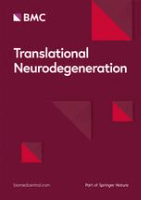
Alzheimers Research & Therapy
Scope & Guideline
Pioneering research for a brighter future in Alzheimer's therapy.
Introduction
Aims and Scopes
- Neurobiological Mechanisms:
Research focusing on the underlying neurobiological processes of Alzheimer's disease, including amyloid-beta and tau pathology, neuroinflammation, and synaptic dysfunction. - Biomarkers and Diagnostics:
Studies exploring various biomarkers, including blood, cerebrospinal fluid, and neuroimaging, to enhance early detection and diagnosis of Alzheimer's disease. - Clinical Trials and Therapeutics:
Investigations into the efficacy and safety of therapeutic interventions, including pharmacological treatments, lifestyle modifications, and innovative therapies. - Epidemiology and Risk Factors:
Research examining the epidemiology of Alzheimer's disease, including risk factors such as genetics, lifestyle, and comorbidities. - Public Health and Policy:
Studies addressing public perceptions, healthcare preparedness, and policy implications related to Alzheimer's disease management and prevention.
Trending and Emerging
- Machine Learning and AI Applications:
Recent publications highlight the increasing use of machine learning and artificial intelligence in predicting disease progression and improving diagnostic accuracy. - Lifestyle Interventions and Prevention:
There is a growing body of research on the impact of lifestyle factors, such as diet and physical activity, on cognitive health and Alzheimer's disease prevention. - Multi-Omics Approaches:
Emerging studies are utilizing multi-omics approaches (genomics, proteomics, metabolomics) to understand the complex biological interactions in Alzheimer's disease. - Sex and Gender Differences:
Research focusing on sex and gender differences in Alzheimer's disease pathology, risk factors, and treatment responses is becoming more prominent. - Focus on Early Detection and Intervention:
There is an increasing emphasis on studies that aim at identifying preclinical Alzheimer's disease and developing interventions at earlier stages of the disease.
Declining or Waning
- Traditional Pharmacological Approaches:
There appears to be a decreasing emphasis on traditional pharmacological approaches, particularly those that do not incorporate newer insights into the disease mechanisms or personalized medicine. - Single-Factor Risk Analysis:
Research focusing solely on single-factor analyses of risk for Alzheimer's disease is becoming less common, as there is a growing recognition of the importance of multifactorial approaches. - Neuropsychiatric Symptoms without Contextual Factors:
Studies focusing solely on neuropsychiatric symptoms, without considering their interaction with cognitive and biological factors, are less frequently published.
Similar Journals

Neuropsychiatric Disease and Treatment
Advancing Neuropsychiatry Through Innovative ResearchNeuropsychiatric Disease and Treatment, published by DOVE MEDICAL PRESS LTD, is a prominent open access journal dedicated to advancing the field of neuropsychiatry. Since its inception in 2009, this journal has provided a platform for the dissemination of high-quality research on innovative therapies and treatments for neuropsychiatric disorders. With an impressive Q2 ranking in Psychiatry and Mental Health and a Q3 ranking in Biological Psychiatry as of 2023, it holds a reputable position within the scholarly community, reflecting its commitment to impactful research. The journal's open access model ensures widespread accessibility, fostering collaboration and dialogue among researchers, clinicians, and students worldwide. The journal accepts a variety of article types, including original research, reviews, and case studies, encompassing a range of topics from pathophysiology to therapeutic advancements. With its base in New Zealand and a Scopus rank placing it within the 69th percentile of Psychiatry and Mental Health, Neuropsychiatric Disease and Treatment is an essential resource for those dedicated to understanding and treating the complexities of neuropsychiatric conditions.

Frontiers in Neurology
Exploring Breakthroughs in Neurological ResearchFrontiers in Neurology is a premier open-access journal dedicated to the advancement of research in the field of neurology, published by FRONTIERS MEDIA SA since 2010. With the ISSN 1664-2295 and an international reach established from its base in Lausanne, Switzerland, this journal has rapidly become a vital resource for neurologists and neuroscientists alike, presenting high-quality research that addresses critical developments in clinical and experimental neurology. Holding a solid Q2 quartile ranking in both neurology and clinical neurology, Frontiers in Neurology demonstrates substantial influence, evidenced by its respectable Scopus rankings—151st in clinical neurology and 77th in neuroscience neurology. The journal employs robust peer review practices to ensure rigor and integrity, while its open-access model fosters widespread dissemination of knowledge. By facilitating interdisciplinary dialogue and empowering research efforts, this journal not only supports the academic community but also contributes to the advancement of treatment and understanding of neurological disorders.

Nature Reviews Neurology
Shaping the Future of Neurology through Scholarly Excellence.Nature Reviews Neurology, published by NATURE PORTFOLIO, stands as a leading scholarly journal dedicated to the field of neurology and neuroscience. With an impressive impact factor and a prestigious Q1 categorization in both Cellular and Molecular Neuroscience and Clinical Neurology, this journal provides cutting-edge reviews and insights into the latest research developments, trends, and clinical practices. Based in the United Kingdom and accessible to a global audience, Nature Reviews Neurology aims to foster knowledge dissemination and interdisciplinary collaboration among researchers, healthcare professionals, and educators. With an influential Scopus ranking, it remains a pivotal resource for those seeking to deepen their understanding of neurological disorders and therapies while remaining at the forefront of academic discourse and innovation in the field.

JOURNAL OF ALZHEIMERS DISEASE
Transforming insights into impactful solutions.Journal of Alzheimer's Disease, published by IOS Press, stands as a pivotal resource in the fight against Alzheimer's and related neurodegenerative disorders. With an ISSN of 1387-2877 and an E-ISSN of 1875-8908, this esteemed journal has evolved since its inception in 1998, providing a vital platform for academic research and clinical practice in the realms of Clinical Psychology, Geriatrics and Gerontology, Neuroscience, and Psychiatry and Mental Health. Ranked in the Q1 category across several disciplines, including Clinical Psychology and Geriatrics, this journal not only highlights significant advancements in understanding Alzheimer's disease but also fosters interdisciplinary dialogue among researchers, healthcare professionals, and policymakers. Boasting robust Scopus rankings—such as 49th in Clinical Psychology and 29th in Geriatrics—this journal is committed to disseminating high-quality research that informs both therapeutic strategies and public health initiatives. The Journal of Alzheimer's Disease is an essential resource for anyone dedicated to exploring the complexities of cognitive decline and enhancing care for affected individuals.

Alzheimers & Dementia
Exploring cutting-edge advancements in dementia care.Alzheimers & Dementia is a premier journal published by WILEY that focuses on the latest advancements in understanding, diagnosing, and treating Alzheimer's disease and other dementias. With an ISSN of 1552-5260 and an E-ISSN of 1552-5279, this influential journal boasts a commendable impact factor and ranks in the Q1 category across several disciplines, including *Cellular and Molecular Neuroscience*, *Geriatrics and Gerontology*, and *Neurology (Clinical)*. By publishing cutting-edge research, systematic reviews, and innovative clinical trials, Alzheimers & Dementia aims to bridge the gap between basic neuroscience and clinical practice, offering valuable insights into the etiology, epidemiology, and management of dementia-related disorders. The journal is hosted in the United States and operates under a balanced access model, providing essential resources for researchers, healthcare professionals, and students dedicated to tackling the challenges posed by these neurodegenerative diseases. Available online, it plays a pivotal role in shaping current and future research directions in the vibrant field of dementia studies.

EUROPEAN JOURNAL OF NEUROLOGY
Exploring Breakthroughs in Clinical Neurology.EUROPEAN JOURNAL OF NEUROLOGY, published by WILEY, stands as a leading platform for the dissemination of innovative research and clinical developments in the field of neurology. With a robust impact factor and prestigious rankings, including being positioned as Q1 in both Neurology and Clinical Neurology categories, the journal plays a pivotal role in shaping neurological sciences from 1994 to 2024. Its Scopus rank highlights its importance, being in the 88th percentile for clinical neurology and 87th percentile for neuroscience. Located in the United Kingdom, the journal thrives as a vital resource for researchers, clinicians, and students dedicated to improving neurological health outcomes. Although it does not offer Open Access, its subscription-based model ensures high-quality peer-reviewed articles are accessible to a global audience, reflecting the continuous pursuit of excellence in neurological research and patient care.

CURRENT OPINION IN NEUROLOGY
Exploring the Frontiers of Neurology.CURRENT OPINION IN NEUROLOGY is a premier academic journal dedicated to providing insightful overviews and critical analyses across all areas of neurology and clinical neurology. Published by Lippincott Williams & Wilkins, this esteemed journal boasts an impressive impact factor, highlighting its influence and relevance in the field—positioning it in the Q1 category for both neurology and clinical neurology as of 2023. With its comprehensive coverage, the journal serves as a vital resource for researchers, healthcare professionals, and students aiming to stay abreast of the latest developments, trends, and breakthroughs in neurological science and practice. Though not open access, articles are available via institutional subscriptions or individual purchase, ensuring that vital research remains accessible to a wide audience. Covering research from its inception in 1993 to ongoing studies in 2024, CURRENT OPINION IN NEUROLOGY stands out as an essential platform for disseminating knowledge and fostering dialogue within the dynamic and evolving landscape of neurology.

Translational Neurodegeneration
Fostering Excellence in Neuroscience ResearchTranslational Neurodegeneration, an esteemed journal in the field of neuroscience, is published by BMC and has been an open access platform since 2012, delivering high-quality research from its base in the United Kingdom. With an impressive impact factor reflecting its significant contributions, this journal focuses on critical advancements in cellular and molecular neuroscience, cognitive neuroscience, and clinical neurology, boasting a Q1 ranking across all these categories as of 2023. Researchers and professionals benefit from its extensive reach, characterized by exceptional Scopus rankings that place it in the top percentile of its field. The journal serves as a vital resource for academics and healthcare practitioners alike, aiming to bridge the gap between laboratory discoveries and clinical applications, thereby enhancing understanding and treatment of neurodegenerative diseases. With its commitment to open access, Translational Neurodegeneration ensures that its published research is accessible to a global audience, promoting collaboration and knowledge exchange within the scientific community.

Journal of Alzheimers Disease Reports
Advancing Knowledge in Alzheimer's ResearchJournal of Alzheimer's Disease Reports, published by IOS PRESS, is an essential open-access platform dedicated to advancing research in the fields of clinical psychology, geriatrics, gerontology, neuroscience, and psychiatry. Since its inception in 2017, this journal has rapidly gained recognition, achieving a commendable status reflected in its 2023 category quartiles, notably ranking Q2 in Clinical Psychology and Psychiatry and Mental Health. With a sustained commitment to disseminating high-quality research and facilitating collaboration among scientists, the journal offers insights into the critical aspects of Alzheimer's disease and related cognitive disorders. Given its positions in the Scopus ranks, it serves as a crucial resource for academics and practitioners alike, empowering them to contribute effectively to the ongoing discourse in cognitive health. The journal embraces open access, ensuring that all research findings are freely available to the global community, thereby enhancing visibility and engagement. With a focus on fostering innovation and knowledge transfer, Journal of Alzheimer's Disease Reports is poised to make an enduring impact in the field of dementia research.

ACTA NEUROLOGICA BELGICA
Exploring the Depths of Neurological Research.ACTA NEUROLOGICA BELGICA is a leading academic journal published by Springer Heidelberg, dedicated to advancing the field of neurology and medicine. With an ISSN of 0300-9009 and E-ISSN 2240-2993, this journal has been a vital resource since its inception, contributing significantly to neurological research and clinical practice. It holds a respectable impact factor with categories spanning from Q2 in Medicine (miscellaneous) to Q3 in Neurology (clinical) as of 2023, indicating its prominence in the scientific community. The journal's extensive coverage since 1959 enhances its historical relevance, while its ongoing publication until 2024 ensures the latest developments are readily accessible. Researchers and practitioners can benefit from its rigorous peer-reviewed articles, which are crucial for staying current in this rapidly evolving discipline. As a scholarly platform, ACTA NEUROLOGICA BELGICA plays a pivotal role in disseminating knowledge and fostering innovation in neurology, making it a must-read for professionals, students, and anyone involved in the field.